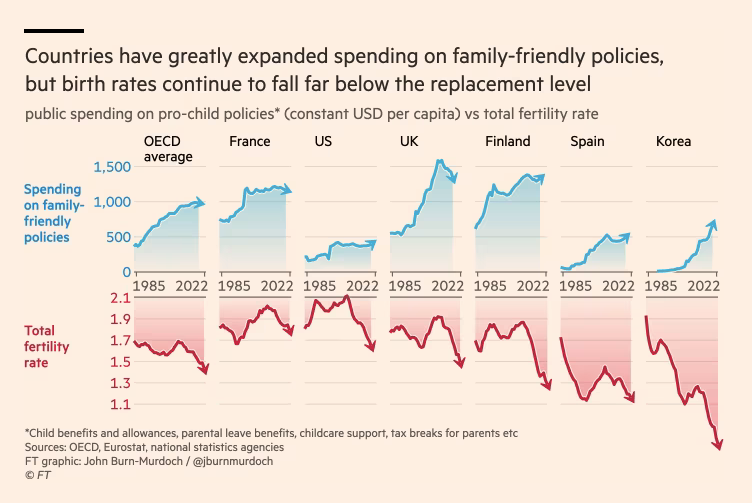S. Korea spent $200b trying to increase its birthrate. Hungary spends 5% of GDP.
Both are failing.
Yet the small country of Georgia spiked its birthrate massively without spending a dollar. How?
They understood that fertility isn't about money. It's about status.
Both are failing.
Yet the small country of Georgia spiked its birthrate massively without spending a dollar. How?
They understood that fertility isn't about money. It's about status.

Before explaining the importance of status, let's quickly note that the common explanations of why fertility is collapsing cannot be the whole story.
As the above countries and the Nordics show, giving people economic benefits to have children doesn't move the needle.
As the above countries and the Nordics show, giving people economic benefits to have children doesn't move the needle.

Religiosity alone does not have the answer.
Even if you isolate the most religious population (weekly church attenders) within the most religious of the major Western countries (the USA), you find barely breakeven fertility rates.
We'll look at the Amish and the Jews shortly.
Even if you isolate the most religious population (weekly church attenders) within the most religious of the major Western countries (the USA), you find barely breakeven fertility rates.
We'll look at the Amish and the Jews shortly.

The last decade has seen a substantial increase in the share of millennials who own homes (by 2022, more than 50% of US millennials were homeowners), but childlessness in the same cohort has continued apace.
The collapse in fertility rates in the Western world, which started over a century ago, long precedes the advent of oral contraceptive pills, as well as endocrine disruptors and other relevant chemical agents which might be interfering with fertility health. 

We are thus presented with an apparent paradox: a stable trend which continues to unfold across the West, in country after country, generation after generation, without an obvious causal logic. How is this to be explained?
I propose that there is, in fact, an under-appreciated fundamental cause of these trends, which manifests in the form of different proximate causes (real and imagined) across different geographies and times.
This fundamental cause is status.
This fundamental cause is status.
Social 'status' denotes a universal set of human instincts and behaviors. Status describes the perceived standing of the individual within the group.
It denotes their social value and their place within the formal and informal hierarchies which comprise a society.
It denotes their social value and their place within the formal and informal hierarchies which comprise a society.
It finds expression in the behaviors of deference, access, inclusion, approval, acclaim, respect, and honor (and indeed in their opposites - rejection, ostracization, humiliation, and so forth). 

Status is gained and maintained through approved behaviors (achievement, etiquette, defending the group) and through the possession of recognized ‘status symbols’ (titles, wealth, important physical assets). 

My belief: our post-enlightenment values result in the net status outcome of having a child being lower than the status outcomes of various competing undertakings - and that this is incredibly important.
I'll break this down in more detail shortly.
I'll break this down in more detail shortly.
As an explanatory factor, status has the advantage of being a relative - as opposed to absolute - attribute.
This is important because absolute material conditions have radically improved, even while birthrates have fallen. Many children used to die young.
This is important because absolute material conditions have radically improved, even while birthrates have fallen. Many children used to die young.

Status is also of existential importance to individuals. This is necessary for our inquiry: we are seeking a behavioral determinant which is powerful enough to influence fundamental human decisions like whether or not to reproduce.
People kill themselves over loss of status.
People kill themselves over loss of status.
Where's the evidence for my theory?
Let us turn to the first of the small number of European and Asian countries which defy wider fertility trends. This is the country of Georgia, which sits at the intersection of the two continents, with a population of about four million.
Let us turn to the first of the small number of European and Asian countries which defy wider fertility trends. This is the country of Georgia, which sits at the intersection of the two continents, with a population of about four million.
In the mid 2000s, Georgia spiked its birth rate, which went from ~50,000 to ~64,000 over the course of two years - a 28% increase, which it sustained for many years. How? 

The evidence points to an unusual factor: a prominent Patriarch of the popular Georgian Orthodox Church, Ilia II, announced that he would personally baptize and become godfather to all third children onwards. 

Births of third children boomed (so much so, in fact, that it eclipsed continuing declines in first and second children).
This has widely been understood as a religious phenomenon, but I propose that it is better understood as a status phenomenon.
This has widely been understood as a religious phenomenon, but I propose that it is better understood as a status phenomenon.
What about the inverse? Can status suppress birthrates?
It can. Let's turn to the canonical example of low fertility: South Korea.
It can. Let's turn to the canonical example of low fertility: South Korea.

Thanks to the Korean formalized systems of etiquette, language, and titles, social hierarchies are clear, explicit, and prominent.
Individuals are incentivized to take whatever measures are necessary to ensure that their rank within the system is maximized.
Individuals are incentivized to take whatever measures are necessary to ensure that their rank within the system is maximized.

This process finds particular expression within the structure of the Korean economy, in which the only high-status employers are the small number of industrial mega-conglomerates like Samsung (the so-called ‘chaebols’).
A quote from Malcolm @SimoneHCollins, who worked there:
A quote from Malcolm @SimoneHCollins, who worked there:
"To understand how much the chaebol system matters in Korea: you are not a person of equal status to other people if you don't work at one of the chaebols."
"The chaebols are extremely important to your social status within Korea… your life is spent to try to get that perfect test score so you can get into the perfect chaebol."
Competition is fierce, and hinges on each individual’s performance in the national exam which determines university places.
This exam is so important that they ground all planes and clear traffic on the one day each year it occurs.
This exam is so important that they ground all planes and clear traffic on the one day each year it occurs.

Each child must receive exceptional training to perform at this exam.
This means parents must pay for extended, expensive tutoring, and this in turn precludes almost all couples from having large families.
This means parents must pay for extended, expensive tutoring, and this in turn precludes almost all couples from having large families.
I provide more examples of status being the clear determinant factor in the most notable fertility trends on my blog.
This thread is already too long, so go there if you want more evidence.
For now, let's understand the specific mechanism at play.
This thread is already too long, so go there if you want more evidence.
For now, let's understand the specific mechanism at play.
A useful model we can take from the literature is to classify the sources of status into three types: dominance, virtue, and success.
Will Storr describes:
"In dominance games, status is coerced by force or fear. In virtue games, status is awarded to players who are conspicuously dutiful, obedient and moralistic."
"In dominance games, status is coerced by force or fear. In virtue games, status is awarded to players who are conspicuously dutiful, obedient and moralistic."
"In success games, status is awarded for the achievement of closely specified outcomes, beyond simply winning, that require skill, talent or knowledge."
In the pre-Enlightenment period, a woman’s status was defined by her birth (class), maintained by her virtue (virginity, piety, motherhood), and modified substantially by her husband’s status.
The primary sources of her status were therefore upheld by the Church (which held a role of social dominance incomparable to today) and her family (embedded within a formalized class structure).
In other words, the pre-Enlightenment woman derived her status from virtue and dominance games.
These virtue strategies did not tradeoff with fertility, and likely supported it, with the Church teaching ‘conjugal duty’ and families demanding heirs.
These virtue strategies did not tradeoff with fertility, and likely supported it, with the Church teaching ‘conjugal duty’ and families demanding heirs.
The Enlightenment brought with it not just intellectual, economic, and scientific revolutions - it drove a status revolution. It challenged the dominance of the Church and aristocracy through the elevation of the ideals of equality, freethinking, and meritocracy.
In turn, this emphasis on the moral primacy of meritocracy changed the primary status game from dominance and virtue to success, with those who demonstrated exceptional knowledge or professional skill held in newly high esteem.
Importantly, meritocracy is an individualist model of status. The status accrued by a prominent scientist does not necessarily extend to his wife or children.
The successful accrual of status through virtue mechanisms requires one to be embedded in a largely static community with shared norms, who appreciate and reward sacrifices made for the group.
Conversely, status markers associated with success (wealth, knowledge, skill) attach primarily to the individual and are fungible across groups and geographies, thereby retaining value in less dense networks.
This becomes important in an era of mass transportation.
This becomes important in an era of mass transportation.
Thus the Enlightenment initially opened up new status opportunities for men (success) whilst undermining those that supported women (virtue).
We all have a psychological need for status, and so it was only a matter of time before women demanded access to and participation within success games (education, commerce, politics, even sport).
Unfortunately, accruing status through success games is time intensive, and unlike virtue games, trades off directly with fertility.
Over time, this set of status mechanics spread, intensified, and deepened, particularly during the process of urbanization during the Industrial Revolution.
Ultimately this culminates in today, when the standard introductory question has become:
‘What do you do?’.
Ultimately this culminates in today, when the standard introductory question has become:
‘What do you do?’.
This is because the most effective way to gauge the status of one’s interlocutor is to understand their level of success within our meritocracy.
Unfortunately, ‘I’m a mother’ is not a good answer to this question, because this conveys little status within a success framework, which is usually the operative one.
So is there any hope for future generations?
Yes.
So is there any hope for future generations?
Yes.
The Amish and the Orthodox Jews have very high birthrates despite living in Western countries.
I propose that the fundamental driver of their birthrate is not merely their religiousness, it is their isolation and in-group preference which has allowed for the preservation of virtue games.
Through the cultivation of intense social density and homogeneity, they have built what I call ‘mimetic infrastructure’, which enforces people’s full participation in their religious duties if they are to maintain standing in the group.
Western governments should pursue policies which give greater space for the rise of other stable groupings of people with sub-identities, within which alternative status ecosystems can flourish.
As a first step, governments must do everything they can to foster the creation of further mimetic infrastructure which supports virtue games.
These cultural colonies must be uninterrupted, to the greatest degree possible, by the state imposition of universal Enlightenment success games.
If you enjoyed this analysis, please subscribe to my blog. I send out week essays and have an archive of almost 100 for you to browse.
Subscribe here:
becomingnoble.substack.com
Subscribe here:
becomingnoble.substack.com
• • •
Missing some Tweet in this thread? You can try to
force a refresh










